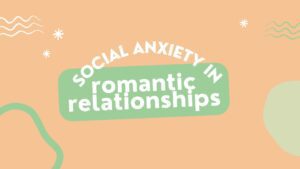What is Social Anxiety?
Social Anxiety Disorder (SAD) is a disorder in which individuals find themselves experiencing significant anxiety, self consciousness, and embarrassment from everyday interactions, due to fear of being judged negatively by others1.
Social Anxiety can lead to avoidance, which can be incredibly disruptive of day-to-day life. It has been known to impact relationships, daily routines, work, school, hobbies, and other activities2.
Symptoms of Social Anxiety
Symptoms can include both emotional/behavioral symptoms, as well as physical symptoms.
Emotional & Behavioral Symptoms
These symptoms are constant:
- Fear regarding situations where negative judgments may be placed upon you.
- Worrying about embarrassing/humiliating yourself.
- Intense fear of interacting/talking to strangers.
- Fear of others recognizing your anxiety, including physical symptoms: blushing, sweating, trembling, shaky voice.
- Avoiding going places/doing things/speaking to others due to fearing embarrassment.
- Avoiding situations where attention may be placed on you.
- Intense fear/anxiety during social situations.
- Over-analyzing your performance/identifying flaws in interactions following social situations.
- Expecting the world possible outcome from a negative experience during social situations.
Physical Symptoms
These signs and symptoms may accompany social anxiety disorder:
- Blushing
- Fast heartbeat
- Trembling
- Sweating
- Upset stomach/nausea
- Difficulty catching your breath
- Dizziness/lightheadedness
- Feeling your mind has gone blank
- Muscle tension3.

Social Anxiety’s Impact on Romantic Relationships
Those who deal with SAD oftentimes find themselves having difficulty establishing, developing, and maintaining romantic relationships. A large part of this is likely related to the problem that those with SAD have being vulnerable with others. For those with SAD, fear of judgment can be overwhelming, which can feel more risky than the potential benefits of a relationship.
Dating Aggression
Studies have found that when adolescents deal with fear of negative evaluation from peers, which is an aspect of social anxiety in which you are afraid of negative perceptions, this significantly predicts male dating aggression. This aggression may be physical, such as slapping, using a weapon, forcing sex, or psychological, slamming doors, insulting, ignoring the other person4.
Online Dating
While online resources can assist in making friendships and romantic relationships more accessible, especially for meeting people or keeping in touch with those who live far away. Dating online can be a wonderful way to meet others and get to know the other person through messaging, texting, emailing, prior to meeting in person. However, it is also important to acknowledge that those with SAD are more likely to find internet relationships easier, safer, and better controlled than in-person relationships. This thought process can lead to excessive internet use, as well as a tendency to avoid in-person socialization. This avoidance can worsen SAD symptoms5.
Relationship Satisfaction
Relationship satisfaction is a term that is used to measure the quality of a romantic relationship. This involves needs being met by one’s partner, the love felt for your partner, and the number of problems within the relationship. Studies have shown that highly socially anxious partners experience a deficit within the quality of their romantic relationships. High anxiety can equate to lack of trust, as well as support within the relationship6.
Social Avoidance
Romantic partners who deal with social anxiety may avoid social situations, leading to a lack of feeling satisfied with friendships and familial relationships. This can cause resentment on both sides: for the person with social anxiety they may feel angry towards their partner when they insist on going to social gatherings, while the other partner may resent how often avoidance is being utilized by the anxious partner. This also can lead to the anxious partner wanting to stay in often due to not wanting to socialize with others. While their partner may want to get out of the house, the anxious partner may put pressure on their loved one to stay in with them.
How to Improve Social Anxiety in Relationships
Focus on ‘the now’
Try grounding yourself in the moment instead of being stuck in your head, worrying about what is going on outside of your control. Utilize grounding techniques when necessary. Focus on being fully engaged in conversations by putting away electronics and being part of the conversation7.
Discuss Personal Wants/Needs
Honesty is incredibly important when building a relationship. In order to truly get to know someone and allow them to know you, it is imperative you are open and honest. This may mean going outside of your comfort zone to kindly disagree with the other person, rather than acting like you have the same views as your date. This also can involve expressing information about your past, aspirations for the future, and personal values.
Many times, those who deal with SAD find themselves ‘people pleasing’. This term refers to going along with others wants or opinions so as not to cause any conflict. However, true intimacy can only develop if both people are being transparent with one another. While this does not all need to happen immediately, as a relationship progresses it is important to be forthcoming with each other8.
Assume the Best
Rather than worrying about all of the ‘what if’s’ before a date, keep in mind that it is unfair to both yourself and others to make assumptions regarding other people’s beliefs and behaviors. Most of us would not appreciate someone else making judgments about us prior to getting to know us, so it is unfair to do this to someone else. Try going into a date with a positive outlook and remembering that as long as you act like yourself, nothing else matters9.
Disrupt Negative Thoughts
When negative thoughts pop into your head, challenge them. If someone does not invite you to a gathering, do not automatically assume it is something against you. Instead ask yourself if it is possible there is another explanation. Identifying and interfering with distorted thinking is something that is necessary to improve upon anxiety10.
Communication
Good communication is imperative in order to have a positive relationship. John Gottman, a Psychologist, came up with the ‘Four Horsemen of the Apocalypse’, which is outlining four negative forms of communicating in a relationship.
Avoid The Four Horsemen
- Criticism: Criticizing a partner with hostility, rather than voicing concerns in a productive manner.
- Contempt: Losing sight of the problem, acting out in anger, and being disrespectful towards partner.
- Defensiveness: When feeling attacked we put up defenses. In order to work through problems it is important to let down these defenses.
- Stonewalling: This is the most common among socially anxious individuals and involves withdrawing from interactions either physically or mentally.
It can become easy to fall into a routine of using each of these and takes considerable effort to combat these habits. However, working through these problems can substantially improve communication in a relationship11.
Dealing with the Social Anxiety
Fixing any problem involves tackling it from the root. This means that in order to help the romantic relationship, it is imperative to work on the social anxiety in itself. This could come with a variety of different techniques, however, a good first step is seeking out a therapist for support throughout the journey.
Seeking Help
If you are social anxiety, our therapists through Online-Therapy.com provide Cognitive Behavioral Therapy (CBT) and can assist in overcoming symptoms of concern.
Our platform offers a complete online therapy toolbox which includes time with a personal therapist who can support you throughout your journey. If this is something you have interest in, we would love to hear from you. References 12 13 14




Leave A Comment